Golez: The President is announcing his objection to the presence of American troops in the Philippines while ironically in Japan, a country that hosts around 50,000 US troops, plus 40,000 dependents and around 5,500 civilians employed by the US bases there: 2,445 Army, 22,108 Navy, 15,6888 Marines and 11,819 Air Force. The Japanese are fiercely nationalistic and understand what it takes to guarantee their national security. I quote from the article:
"(CNN)Philippine President Rodrigo Duterte said Wednesday that he wants foreign troops to leave his country, possibly within the next two years.
"I want them out," he said. "And if I have to revise or abrogate agreements, executive agreements, I will."
"Speaking to business leaders in Tokyo during an official visit to Japan, Duterte warned that he would not be a "doormat" for the international community. But he also sought to reassure neighbors and allies that his state visit to Beijing a week ago was focused on trade, not security."
Philippines' Duterte on foreign troops: 'I want them out'
Story highlights
- A White House spokesman describes Duterte's comments as "rhetoric"
- The Philippine President says he wants foreign troops to leave, possibly within two years
(CNN)Philippine President Rodrigo Duterte said Wednesday that he wants foreign troops to leave his country, possibly within the next two years.
"I want them out," he said. "And if I have to revise or abrogate agreements, executive agreements, I will."
Sponsor Content
20 things you didn’t know about MBS. Click for details
An architectural icon conceived by renowned architect, Moshe Safdie, Marina Bay Sands in Singapore contains its fair share of secrets.
Content provided by Marina Bay Sands
Speaking to business leaders in Tokyo during an official visit to Japan, Duterte warned that he would not be a "doormat" for the international community. But he also sought to reassure neighbors and allies that his state visit to Beijing a week ago was focused on trade, not security.
"You know, I went to China for a visit, and I would like to assure you that all there was (discussed) was economics. We did not talk about arms, we did not talk about stationing of troops... We avoided talking about alliances, military or otherwise," he said. "What happened there was just a few platforms where investments could come in."
He said that the country was "mandated" by its constitution "to adopt an independent foreign policy."
During the speech, which began by praising Japanese-Filipino bilateral ties, he quickly pivoted to oft-visited topics, including his support for his country's bloody war on drugs and his perceived victimization by the international community.
"If you chastise me, reprimand me before the international crowd and you say: 'Mr. Duterte, you stop the killings there... stop it because we will withhold aid and assistance to your country' -- it's like saying, 'I am a dog on a leash, and if you do not stop biting the criminals, we will not throw the bread right under your mouth, we will throw it further so you'll have to struggle to get it.'
"That's what America wants me to be, a dog barking for the crumbs of their favor."

Photos: Rodrigo Duterte has said some outrageous things.
Duterte made international headlines in April 2016 with his inflammatory comments on the 1989 rape and murder of an Australian missionary that took place in Davao City.
Hide Caption
6 of 11
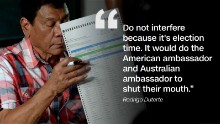
Photos: Rodrigo Duterte has said some outrageous things.
Foreign diplomats weighing in on Rodrigo Duterte's controversial remarks did not sit well with the then-mayor.
Hide Caption
7 of 11

Photos: Rodrigo Duterte has said some outrageous things.
He also lashed out at the womens' group that filed a complaint against him before the Commission on Human Rights (CHR).
Hide Caption
8 of 11

Photos: Rodrigo Duterte has said some outrageous things.
At a CNN Philippines Townhall event in February 2016, Duterte, admitted that he had three girlfriends and a common-law wife. His marriage to Elizabeth Zimmerman was annulled due to his womanizing, but he denied this meant he objectified women.
Hide Caption
9 of 11

Photos: Rodrigo Duterte has said some outrageous things.
Although he later denied the accusations, the former Davao City mayor admitted his links to the alleged Davao death squad in a May 2015 broadcast of his local television talk show.
Hide Caption
10 of 11
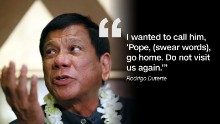
Photos: Rodrigo Duterte has said some outrageous things.
Duterte apologized to the Pope after cursing him for the traffic he caused during a 2015 Papal visit to the Philippines.
Hide Caption
11 of 11

Photos: Rodrigo Duterte has said some outrageous things.
After US president Barack Obama said he would raise extrajudicial killings in a meeting with Duterte, the Philippines President responded angrily on September 5, first in English then in Tagalog. As a result, Obama canceled the meeting.
Hide Caption
1 of 11
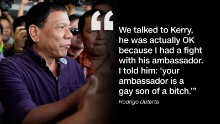
Photos: Rodrigo Duterte has said some outrageous things.
As he addressed troops at the country's Armed Forces Central Command Headquarters on August 5, Duterte recounted U.S. Secretary of State John Kerry's visit to the country, saying in Tagalog that he was feuding with U.S. Ambassador to the Philippines Philip Goldberg.
Hide Caption
2 of 11

Photos: Rodrigo Duterte has said some outrageous things.
The Philippines president-elect effectively said he supported vigilantism against drug dealers and criminals in a nationally televised speech in June 2016.
Hide Caption
3 of 11
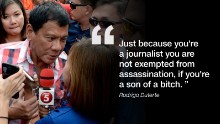
Photos: Rodrigo Duterte has said some outrageous things.
Speaking at a press conference to unveil his new cabinet on May 31 2016, Rodrigo Duterte said journalists killed on the job in the Philippines were often corrupt.
Hide Caption
4 of 11

Photos: Rodrigo Duterte has said some outrageous things.
During the third and last presidential debate, Duterte had said that he would plant a Philippine flag in disputed territories should China refuse to recognize a favorable ruling for the Philippines.
Hide Caption
5 of 11

Photos: Rodrigo Duterte has said some outrageous things.
Duterte made international headlines in April 2016 with his inflammatory comments on the 1989 rape and murder of an Australian missionary that took place in Davao City.
Hide Caption
6 of 11

Photos: Rodrigo Duterte has said some outrageous things.
Foreign diplomats weighing in on Rodrigo Duterte's controversial remarks did not sit well with the then-mayor.
Hide Caption
7 of 11

Photos: Rodrigo Duterte has said some outrageous things.
He also lashed out at the womens' group that filed a complaint against him before the Commission on Human Rights (CHR).
Hide Caption
8 of 11

Photos: Rodrigo Duterte has said some outrageous things.
At a CNN Philippines Townhall event in February 2016, Duterte, admitted that he had three girlfriends and a common-law wife. His marriage to Elizabeth Zimmerman was annulled due to his womanizing, but he denied this meant he objectified women.
Hide Caption
9 of 11

Photos: Rodrigo Duterte has said some outrageous things.
Although he later denied the accusations, the former Davao City mayor admitted his links to the alleged Davao death squad in a May 2015 broadcast of his local television talk show.
Hide Caption
10 of 11

Photos: Rodrigo Duterte has said some outrageous things.
Duterte apologized to the Pope after cursing him for the traffic he caused during a 2015 Papal visit to the Philippines.
Hide Caption
11 of 11

Photos: Rodrigo Duterte has said some outrageous things.
After US president Barack Obama said he would raise extrajudicial killings in a meeting with Duterte, the Philippines President responded angrily on September 5, first in English then in Tagalog. As a result, Obama canceled the meeting.
Hide Caption
1 of 11

Photos: Rodrigo Duterte has said some outrageous things.
As he addressed troops at the country's Armed Forces Central Command Headquarters on August 5, Duterte recounted U.S. Secretary of State John Kerry's visit to the country, saying in Tagalog that he was feuding with U.S. Ambassador to the Philippines Philip Goldberg.
Hide Caption
2 of 11

Photos: Rodrigo Duterte has said some outrageous things.
The Philippines president-elect effectively said he supported vigilantism against drug dealers and criminals in a nationally televised speech in June 2016.
Hide Caption
3 of 11

Photos: Rodrigo Duterte has said some outrageous things.
Speaking at a press conference to unveil his new cabinet on May 31 2016, Rodrigo Duterte said journalists killed on the job in the Philippines were often corrupt.
Hide Caption
4 of 11

Photos: Rodrigo Duterte has said some outrageous things.
During the third and last presidential debate, Duterte had said that he would plant a Philippine flag in disputed territories should China refuse to recognize a favorable ruling for the Philippines.
Hide Caption
5 of 11

Photos: Rodrigo Duterte has said some outrageous things.
Duterte made international headlines in April 2016 with his inflammatory comments on the 1989 rape and murder of an Australian missionary that took place in Davao City.
Hide Caption
6 of 11
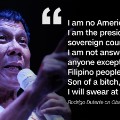

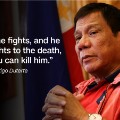
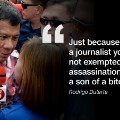
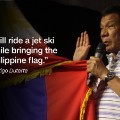
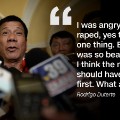
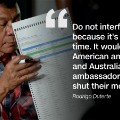
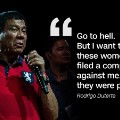

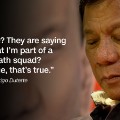
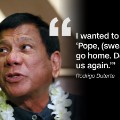
Grudges old and new
Duterte had reignited his war of words with the United States on Tuesday, bringing up old grudges and throwing in some new musings on American influence in his country and the region.
A speech at the airport in Manila just before he departed for Japan echoed comments he made a week ago in Beijing, in which he pronounced the end of his country's relationship with the United States, saying "America has lost."
US Assistant Secretary for East Asian Affairs Danny Russel visited Manila last weekend to meet with Filipino officials, including the foreign and defense ministers, in an attempt to gain clarity on Duterte's Beijing comments, after they caused "consternation" in the United States.
Filipino Foreign Secretary Perfecto Yasay and Presidential Spokesman Ernesto Abella both reiterated on Monday that all treaties and agreements will still be honored.
US officials say there have been no instructions for any tangible application of the remarks by Duterte. "This was not very well thought out, but it doesn't seem to have very deep roots either," a US official told CNN.
White House spokesman Josh Earnest told reporters Wednesday that the United States hasn't received any official word from the Philippines about changes in the alliance between the two countries.
"That's why the news coming out of the Philippines, I would classify (it) as rhetoric at this point. ... But it does contribute to some uncertainty, and that uncertainty is inconsistent with what has over the last several decades been a rock-solid alliance," Earnest said.
Signals end of military cooperation
On Tuesday he also held forth on the Enhanced Defense Cooperation Agreement with the United States (ECDA), which he has previously suggested he will disregard, starting with the end to joint military drills.
"I do not want to see any military man of any other nation (in the Philippines), except the Filipino soldier," he said.
The agreement was signed in by Duterte's predecessor, Nonoy Aquino, by executive order and could be rescinded by Duterte, but would likely face opposition in the country's Senate.
Russel said the United States has "every intention of continuing to meet all our security commitments in the mutual defense treaty."
He returned to the theme in Tokyo, saying that he would, as "a last maneuver," would "revise or abrogate agreements, executive agreements" to free the Philippines "from the presence of foreign military troops."
CNN's Elise Labott, Catherine E. Shoichet, Trey Haney and Allison Malloy contributed to this report.


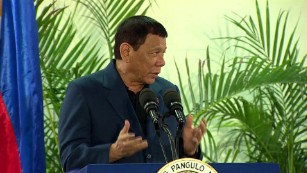
No comments:
Post a Comment